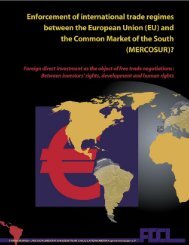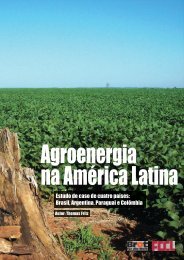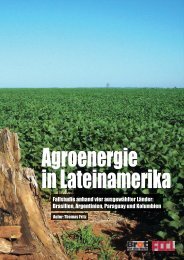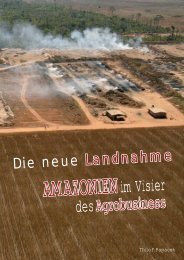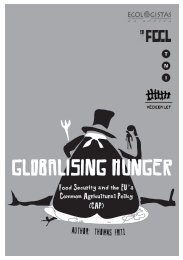(EU) and the Common Market of the South (MERCOSUR)? - FDCL
(EU) and the Common Market of the South (MERCOSUR)? - FDCL
(EU) and the Common Market of the South (MERCOSUR)? - FDCL
Create successful ePaper yourself
Turn your PDF publications into a flip-book with our unique Google optimized e-Paper software.
European Parliament to adopt a statement regarding Argentina, that dem<strong>and</strong>s<br />
help, refers to <strong>the</strong> cultural roots <strong>and</strong> to a particular human right in modern<br />
societies, <strong>the</strong> right to property.” 251<br />
An addition: in Brazil Spanish corporations dispose <strong>of</strong> a FDI stock <strong>of</strong> currently 25<br />
billion US-dollars, which represents a share <strong>of</strong> 14% <strong>of</strong> total foreign direct investment<br />
in Brazil. 252<br />
The German government on its part has always pleaded for <strong>the</strong> interests <strong>of</strong> <strong>the</strong><br />
German trade associations <strong>and</strong>, in <strong>the</strong> case <strong>of</strong> German interests in Brazil, can look<br />
back on a tradition <strong>of</strong> more than forty years. 253 From October 27-28 in Goiánia, federal<br />
state <strong>of</strong> Goiás, <strong>the</strong> 21st German-Brazilian Economic Meeting took place, organized<br />
by <strong>the</strong> BDI <strong>and</strong> its Brazilian partner organization CNI. 254 There it was regretfully<br />
stated that:<br />
“German participation in <strong>the</strong> total Foreign Direct Investment in Brazil has fallen<br />
from more than 25% to less than 7%.” 255<br />
In order to confront this decrease in <strong>the</strong> FDI flows between Germany <strong>and</strong> Brazil,<br />
<strong>the</strong> communities from politics <strong>and</strong> trade ga<strong>the</strong>red in Goiánia proposed <strong>the</strong> following:<br />
“The German side suggested that a bilateral investment protection <strong>and</strong> promotion<br />
treaty would fur<strong>the</strong>r improve <strong>the</strong> conditions for foreign investment,<br />
especially for small <strong>and</strong> medium-sized companies, <strong>and</strong> asked for rapid ratification<br />
<strong>of</strong> <strong>the</strong> negotiated bilateral investment protection <strong>and</strong> promotion treaty.<br />
The Brazilian side stated that <strong>the</strong> issue is under review. It was agreed that <strong>the</strong><br />
subject will return to <strong>the</strong> agenda <strong>of</strong> <strong>the</strong> next meeting. [...] The German side recognized<br />
<strong>the</strong> positive effect for fur<strong>the</strong>r investment in Brazil potentially resulting<br />
from <strong>the</strong> adoption <strong>of</strong> <strong>the</strong> draft legislation on transfer pricing currently debated<br />
251 Own translation <strong>of</strong> <strong>the</strong> following original text: “Denn keines der <strong>EU</strong>-Länder mit nennenswerten Investitionen im<br />
<strong>MERCOSUR</strong> will Terrain aufgeben. Darunter z.B. in Argentinien an erster Stelle Spanien (39%), gefolgt von den<br />
USA (28%), Frankreich (7%), Kanada (6%) und Italien (5%). Gleich um die Jahreswende [2001/2002, Erg.d.A.]<br />
belagerte die spanische Regierung die Casa Rosada (Regierungssitz) in Buenos Aires, um zu erwirken, dass<br />
die Gewinne spanischer Firmen in Argentinien nicht in abgewerteten Pesos, sondern in Devisen nach Spanien<br />
transferiert würden. Im Juli 2002 setzen die spanischen Mitglieder der Fraktion der Volksparteien (EVP, darin die<br />
deutsche CDU/CSU und die österreichische ÖVP) im Europäischen Parlament eine Entschließung zu Argentinien<br />
durch, in der Hilfe gefordert, auf die kulturellen Wurzeln verwiesen und insbesondere auf ein Menschenrecht in<br />
modernen Gesellschaften verwiesen wird, nämlich das Recht auf Eigentum.” Taken from: Küppers, Gaby: It takes<br />
four to tango. Nach dem Tango-Effekt hat die <strong>EU</strong> die Verh<strong>and</strong>lungsspur mit dem <strong>MERCOSUR</strong> verloren, in: ila No.<br />
260, p. 33.<br />
252 Valor Econômico, October 28, 2003.<br />
253 Torrelli, Claudia: <strong>MERCOSUR</strong> for sale? The <strong>EU</strong>’s FTAA <strong>and</strong> <strong>the</strong> need to oppose it. Corporate Europe Observatory<br />
(CEO) & Transnational Institute (TNI), Info Letter, Amsterdam, August 2003, p. 3.<br />
254 http://www.encontrobrasilalemanha.com.br/<br />
255 REPORT OF THE 2003 GERMAN-BRAZILIAN ECONOMIC MEETING (XXX MEETING OF THE JOINT<br />
COMMISSION ON ECONOMIC CO-OPERATION AND XXI ENTREPREN<strong>EU</strong>RIAL MEETING), see: http://www.iberoamerikaverein.de.<br />
89



